With the release of PanelAlpha v1.0 ready for production, we have included our own PanelAlpha Engine in the BETA version. It is a Docker-based solution allowing you to configure a VPS or a dedicated server for your customer, and use it as a hosting environment for their WordPress instances. All the management of the WordPress instance will be fully functional in the PanelAlpha system just like in the case of control panel integrations (cPanel, Plesk, DirectAdmin).
What’s more, the Engine offers an option to host multiple clients on a single server, each one getting a separate Docker container so they are fully isolated. We expect, however, that the performance of a single server hosting hundreds of customers would be much lower than the typical shared hosting control panel solution, so we do not recommend using it this way.
In this article, we are presenting the performance test results for a single WordPress instance in the PanelAlpha Engine BETA version compared to the most popular shared hosting control panels.
In our opinion, these results are extremely surprising as in some cases our solution works up to 28 times faster.
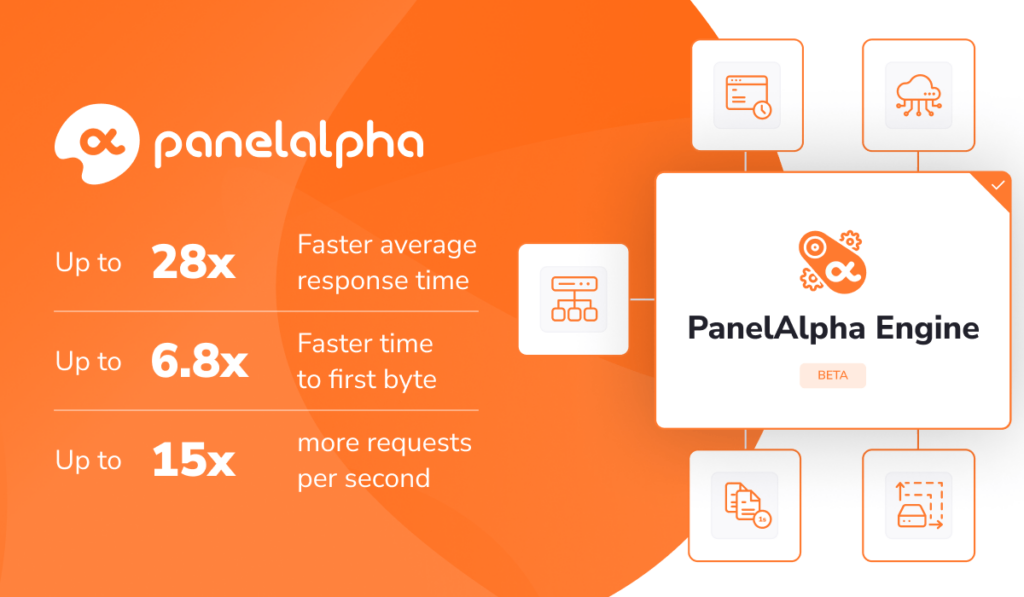
Prerequisites
Before you read through the test results, please learn more about the setup we have been using:
- These are initial tests and we plan to add a few more features to the PanelAlpha Engine before it is announced as a full production-ready system. We expect that the performance might be affected by these changes, but not significantly.
- The WordPress instances were tested without any cache. For static sites like a blog on WordPress, using cache would considerably reduce the difference between PanelAlpha Engine and other tested solutions. However, dynamically loaded sites, such as shops built with WooCommerce, will be much faster.
- The tests were made with 20 concurrent users accessing the WordPress site.
- For control panels vs PanelAlpha Engine tests, we used Hetzner Cloud hosting with a server matching minimum requirements for all the tested software:
- CX21, Shared vCPU x86, 2vCPUS, 4 GB RAM, 40GB SSD
- Raw test results are available here.
PanelAlpha Engine vs Shared Hosting Control Panels
1. Average response time
We started the tests by checking the average response time. This, in our opinion, is the most important metric, as a slow loading time of the site may significantly affect churn of users on the site.
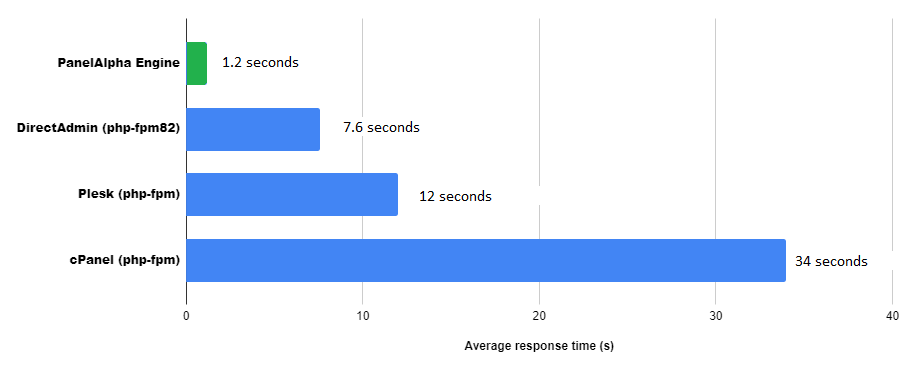
As you can see, our Engine performed significantly faster than the other control panels. We suspect that it is because of the default inclusion of multiple services running on the server alongside those control panels. Although some extra optimization of the panels could help achieve better results, it remains doubtful that their performance would match the PanelAlpha Engine’s outcome. For some reason, cPanel scored the most disappointingly in this test, the above result being the best of all the numbers recorded in the course of multiple re-runs.
2. Average requests per second
The second test aimed to measure the instance’s capacity to handle average requests per second. Greater capacity in this respect translates to better handling of concurrent visitors, which is of crucial importance to larger shops where full caching is not possible (e.g. when calculating the cart).
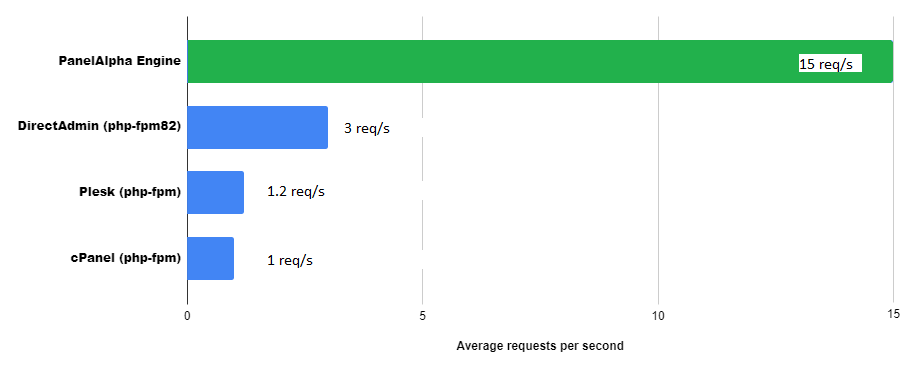
The results above also show a significant difference between our PanelAlpha Engine and the other tools. When compared to cPanel and Plesk, PanelAlpha Engine scored even 15 times better on the same server. Although DirectAdmin turned out to be much faster than the other two, the achieved result remains significantly worse than PanelAlpha Engine’s outcome.
3. Time to first byte
TTFB (time to first byte) is also a key factor that affects customer experience and should be optimized so that the values are as low as possible. In this test, we tested it against a product page in WooCommerce with 30 requests.
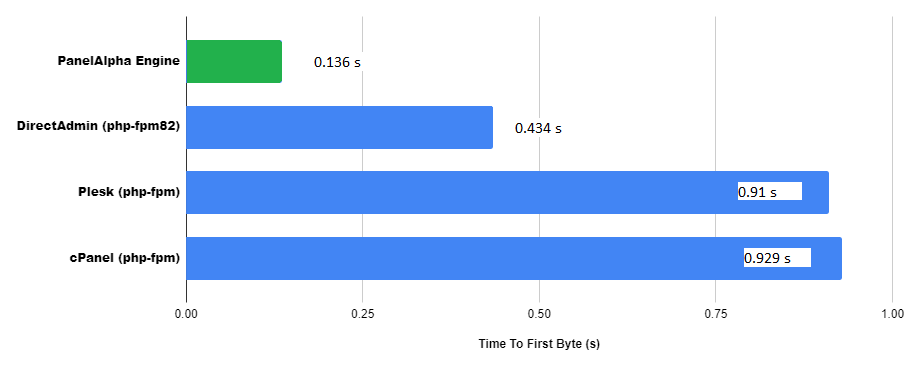
As shown in the above graph, PanelAlpha Engine outperformed the other control panels, producing the outcome that indicates much greater responsiveness of the server which contributes to faster webpage loading time.
4. 90th percentile
The next test was conducted to measure 90th percentile for latency.
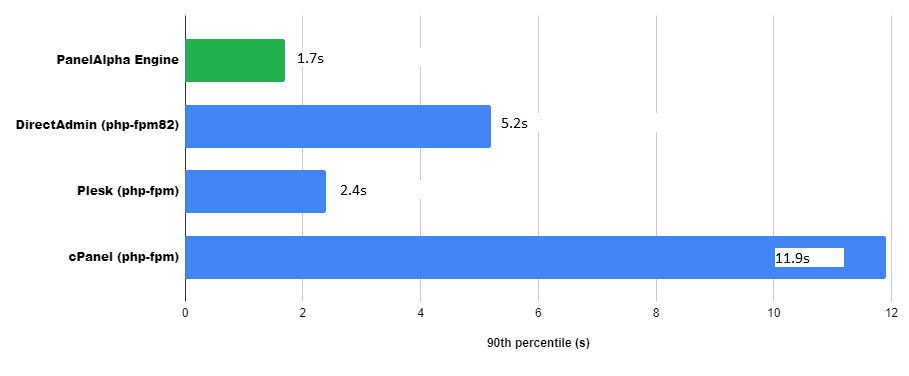
In comparison with the other solutions, Plesk came much closer to the result achieved by the leading PanelAlpha Engine, being slower only by 0.7s. According to the above graph, the longest response times were reported while testing cPanel.
5. Average request duration
Lastly, we assessed the average request duration, which reflects the total time needed to process requests from the moment they are initiated until the last byte received from the server. This is also another way to measure website loading time, the faster the result, the better.
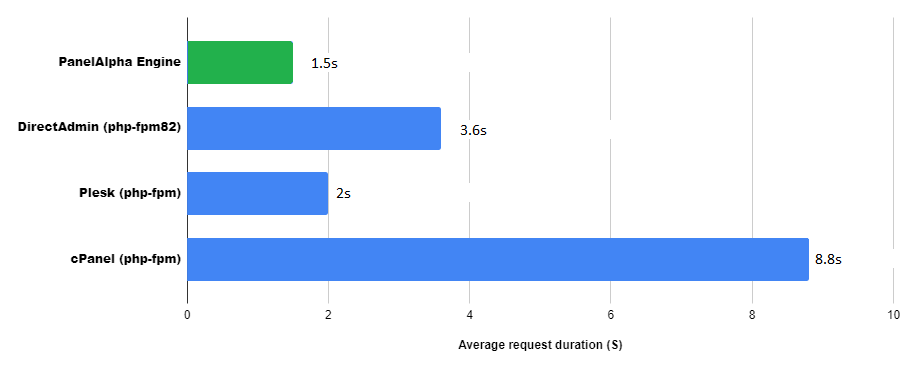
The results presented above show a slight advantage that PanelAlpha Engine gained over Plesk. However, the performance of the other control panels placed them behind the two top solutions. This relates especially to cPanel which, similarly to its outcomes in the previous tests, turned out to be the least responsive as it required an incomparably greater amount of time to fulfill requests.
Conclusion
Given all the results obtained through the whole testing process, PanelAlpha Engine clearly stands out as the most responsive, the fastest and thus the most promising tool when compared to DirectAdmin, Plesk and cPanel. It needs to be mentioned that the next versions are sure to feature some modifications, however, the current performance can be described as impressive and conducive to our customer-oriented strategy. This is why we are positively hopeful when it comes to pursuing our goal of setting new standards in the field.
We understand you may not be fond of taking our word for it all. In case you do not believe the numbers, just test the PanelAlpha Engine’s performance on your own. Then let us know if you have got similar results or whether there is a setup where our panel has not outperformed the others significantly. We will be happy to cooperate with you on further research.








Comments